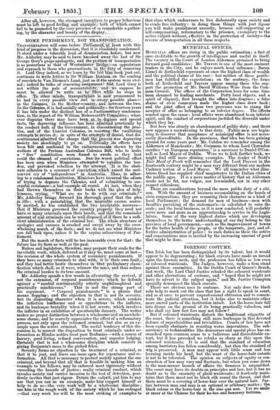MUNICIPAL OFFICES.
MUNICIPAL offices are rising in the public estimation ; a fact at once creditable to the growth of intelligence and useful in itself. The vacancy- in the Court of London Aldermen promised to bring forward good candidates : Mr. Travers is one of the most eminent traders in the City, and he enjoys much local influence ; Baron Lionel de Rothschild represents at once the highest class of wealth and the political claims of his race : but neither of those gentle- , men has fulfilled the expectation; on the contrary, the firms both of Rothschild and Travers appear amqng;those who sup- port the promotion of Mr. David Williams Wire, from the Com- mon Council. The offices of the Corporation have for some time been shunned by leading merchants. Petty local objects, and a spirit of eliquery, first brought the offices into.disgrace ; a false shame of civic ecamexion made the . higher class draw back ; and the joint effect of those two processes was to stamp the accepter of office as belonging to an inferior degree. The effects reacted upon the cause: dotal affairs were abandoned to an inferior spirit, and the conduct of corporations justified the discredit under which they lay.
But here was clearly an abandonment of public duty;' and there
now appears a reawakening to that 'duty. Public men are begin- ning to discover that acceptance of municipal office is net neces- sarily discreditable. In the provinces, that idea has been gaining ground for some years past : Mr. Cobden we remeMber among the Aldermen of Manchester; Mr. Guinness, to whom lord Clarendon ascribes "an European reputation" is a successor to Daniel O'Con- nell as Lord Mayor of Dublin. We're we to look further back, we might find still more shining examples. The reader of Scott's Fair Maid of Perth will remember that the Lord Provost in the fourteenth century, might be a man very different froniOur modem Cockney notion of a Lord Mayor. We all remeinber What illus- trious blood has supplied chief magistrates to the Italian cities of the middle ages. It is a mere matter of history that an Alderman needs not be fat, nor vulgar, nor lowminded, nor in any other respect ridiculous;"
There are considerations beyond the mere public duty of a citi-
zen. With the amount of business accumulating on the hands of civic corporations, they are resuming their character as a kind of local Parliament ; the demand for men -of ,bnsiitess—men with faculties partaking of the statesman's—is' calculated to raise the scale ; and the local business, as it is now conducted, will probably serve more and more as an apprenticeship to service in the Legis- lature. Some of the very highest duties which are developing themselves to 'the better understanding of our (14 belong to the province of local government,—such as the improvement of towns for the better health of the people, or the temperate, „just, and ef- fective administration of police:' to such duties WI thesb the active and conscientious man is invited by the increasing amount of good that might be done.


























 Previous page
Previous page